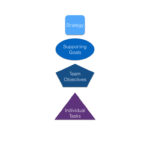Productivity is a hugely popular topic and there is no shortage of authors, teachers and ‘gurus’ out there to help you get more productive. You may be using Microsoft Outlook at work but if you do a search on ‘productivity apps’ you will get an avalanche of options for your laptop, phone and tablet. Productivity is a big deal and big business. It has advanced way beyond the days of sending people to a time management program and see them return with a paper planner in a binder. If you don’t remember those days you did not miss much.
Do you ever wonder why key strategic milestones and projects are not completed successfully and on time? Is your organisation slow to respond to changing internal external pressures? Are you only discovering failed or stalled projects when it is too late?
Organisational and team productivity is not always a sum of the ‘parts.’ Every person in a team may be highly productive but this does not always translate to overall productivity when measured by successfully achieving objectives. As a leader you need to take a deeper dive and build processes that will ensure productive activity achieves outcomes. 
Our process on a high level includes the following and we may go into a deeper dive in subsequent posts. In addition we have a number of tools to help teams and managers execute tasks and achieves tasks more effectively.
- Your corporate or organisation’s strategy must be clearly ‘cascaded’ to the individual level. Each person must have ‘line of sight’ from their role to the overall strategy.
- Your strategy should be broken down into goals, objectives and tasks in alignment with your structure and the strategic horizons assigned to roles and job titles in your business. This is a very simple structure.
- The most difficult phase of achieving excellence in execution is changing the way people work together and introducing systems and discipline in at least one management process. This process includes the following steps:
- Weekly team meetings with a structure set of questions coupled with accurate note taking, task creation, task assignments and follow up. The manager meets with the team every week.
- The agenda is fast and focused.
- What are you working? Is it on your work plan and/or task list?
- Is there anything or person disrupting or distracting you from achieving completion?
- The manager asks, “What can I do to ‘clear the path’ or support you in achieving your tasks?” This is recorded as well.
- The manager has one day or less to follow up with the person on actions taken.
4. The meetings are fully documented and retained. I have clients who use OneNote or Evernote to record these meetings. The information captured is excellent for use in management meetings, reporting up the organisation and for performance reviews with the manager and team members. This post is sponsored by our partners.
This can be a major change program depending upon existing systems and processes in your business and the culture you have. This type of process must be implemented at all levels of the organisation and not focused on one business unit or functional area. All managers who will be conducting the weekly team meetings must be trained in how to conduct them and record information. If a manager is away for any reason the weekly meetings must still occur.
The end in mind for this change initiative is achieving higher levels of engagement, adaptability and competitiveness. You achieve these outcomes by enabling people to work effectively to achieve your strategic objectives.
